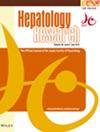Interleukin-33 and liver natural killer cells: A novel perspective on antitumor activity in liver fibrosis
Abstract
Aim
Liver fibrosis, heralding the potential progression to cirrhosis and hepatocellular carcinoma (HCC), compromises patient survival and augments post-hepatectomy recurrence. This study examined the detrimental effects of liver fibrosis on the antitumor functions of liver natural killer (NK) cells and the interleukin-33 (IL-33) signaling pathway.
Methods
Our investigation, anchored in both human physiologies using living and deceased donor livers and the carbon tetrachloride (CCl4)-induced mouse fibrosis model, aimed to show a troubling interface between liver fibrosis and weakened hepatic immunity.
Results
The Fibrosis-4 (FIB-4) index emerged as a salient, non-invasive prognostic marker, and its elevation correlated with reduced survival and heightened recurrence after HCC surgery even after propensity matching (n = 385). We established a strong correlation between liver fibrosis and liver NK cell dysfunction by developing a method for extracting liver NK cells from the liver graft perfusate. Furthermore, liver fibrosis ostensibly disrupted chemokines and promoted IL-33 expression, impeding liver NK cell antitumor activities, as evidenced in mouse models. Intriguingly, our results implicated IL-33 in diminishing the antitumor responses of NK cells. This interrelation, consistent across both mouse and human studies, coincides with clinical data suggesting that liver fibrosis predisposes patients to an increased risk of HCC recurrence.
Conclusion
Our study revealed a critical relationship between liver fibrosis and compromised tumor immunity, emphasizing the potential interference of IL-33 with NK cell function. These insights advocate for advanced immunostimulatory therapies targeting cytokines, such as IL-33, aiming to bolster the hepatic immune response against HCC in the context of liver fibrosis.


 求助内容:
求助内容: 应助结果提醒方式:
应助结果提醒方式:


